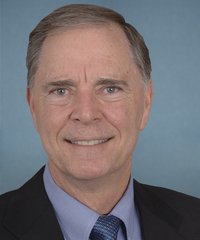
Congressman Bill Posey represents Florida's 8th Congressional District which encompasses all of Brevard and Indian River Counties, and a small portion of Orange County (Bithlo, Christmas and Wedgefield). Posey, a Republican, was elected to U.S. House of Representatives in 2008 and is currently serving his seventh term.
In the House, Congressman Posey serves on the Financial Services Committee and its two subcommittees on Consumer Protection & Financial Institutions and Housing, Community Development & Insurance.
Posey also serves on the Committee on Science, Space and Technology and its subcommittee on Space & Aeronautics.
Our investment in space exploration has had a positive impact on our nation and the world. Below are some important legislative victories to help boost our space program and make America more competitive.
Keeping America First in Space
Record Funding for Exploration Ground Systems: Florida’s Space Coast is the world’s premiere launch location, and our nation’s access to space requires the ongoing investments in Florida’s exploration ground systems to ensure safe and dependable launches for the next generation of space vehicles. That is why I have fought for and secured record funding increases for ground systems at Kennedy Space Center (KSC), and safeguarded these dollars from redirection to other states competing for these critical funds. Additionally, KSC secured Congressional backing for a second mobile launch platform, which allows for more launch opportunities for human and robotic missions.
Moving Forward with the Orion Multi-Purpose Crew Vehicle: Year-after-year Congress takes decisive, bipartisan action to maintain vital funding for the Orion spacecraft. Orion’s successful flight demonstration in 2014 inspired many to look forward to Americans exploring deep space again. Exciting work on Orion is moving forward at KSC, and I will continue to lead the effort in the House to counter any future budget requests that would put this program, or its companion, the Space Launch System (SLS), at risk.
Commercial Crew: The return of American astronauts launching on an American vehicle from American soil are almost within reach. NASA has selected astronauts for upcoming launches with the Boeing Starliner and SpaceX Dragon capsules. In Congress, we have supplied the necessary resources to successfully launch these brave Americans into space on commercial space vehicles. This program is critical to restoring American access to low earth orbit. Additionally, my colleagues and I on the House Science Committee are examining options for extending the operations of the International Space Station (ISS).
Exploring the Moon and Mars: Throughout the current and former Administrations, I’ve advocated for our nation’s leadership in deep space exploration and introduced bipartisan legislation to return Americans to the Moon as a stepping-stone to Mars and other destinations in the solar system. The President has answered the call and challenges of human space flight by signing into law the 2017 NASA reauthorization and reestablishing the National Space Council.
As part of the next NASA reauthorization, I’ve authored language directing NASA and the National Space Council to give Congress a strategic plan to return our astronauts to the Moon and then to Mars. With such a plan, Members of Congress can advocate for the resources necessary to meet these important goals.
Space Support Vehicles: The Federal Aviation Administration (FAA) oversees the growth of the commercial space sector, however the FAA has not kept pace with innovative space vehicle designs or vehicles intended for training or research, including simulating launch, reentry, or space flight conditions. With strong bipartisan support, the House of Representatives passed my legislation to utilize these new vehicles. In an encouraging legislative move, the House passed this legislation twice, in two separate bills: the FAA reauthorization bill and another bill advanced by the House Science Committee. Doing this increases the odds of these common sense reforms passing the Senate and getting signed into law by the President.
Click here to learn more about NASA's current and future missions in space.